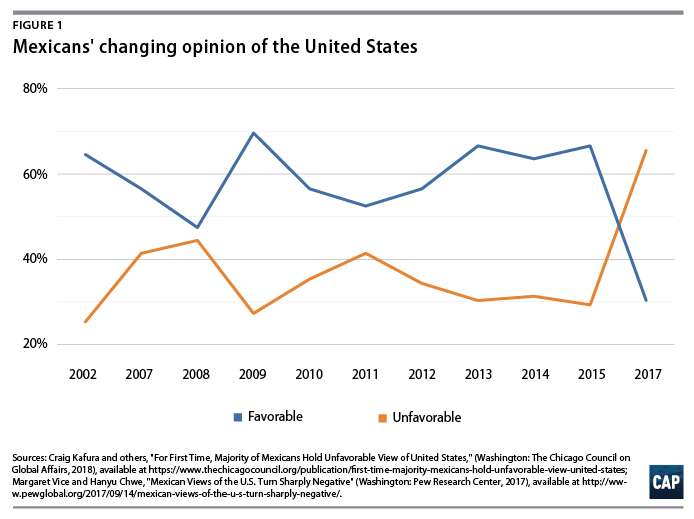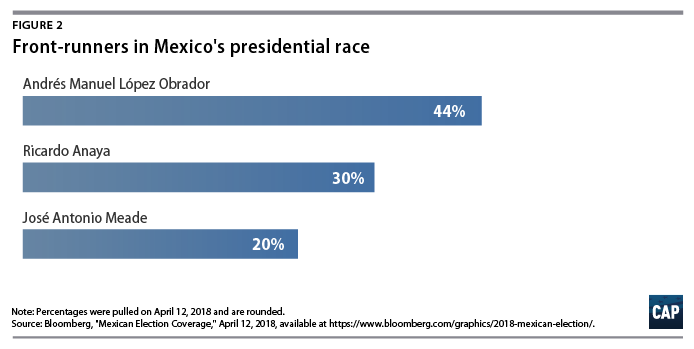Mexican views of the United States have deteriorated along with Mexican views of the current U.S. administration. Approximately two-thirds of Mexicans hold an unfavorable view of the United States—with 93 percent lacking confidence in the U.S. president’s judgment on foreign affairs—according to recent polling. This is in striking contrast to the generally pro-American views that Mexicans have held over the past decades.

Meanwhile, Andrés Manuel López Obrador (AMLO)—a left-wing populist who has vocally opposed the current U.S. administration and its plans for a border wall—has a significant lead in the polls for the July 1 presidential election. Campaigning on a “Mexico and Its People First” message, the former Mexico City mayor ran for president—and contested his loss—in both 2006 and 2012. In recent months, AMLO has concerned progressives by aligning with the far-right Social Encounter Party and dismissing the possibility of Russian interference in the Mexican election.
Corruption and human rights scandals have pervaded the tenure of current President Enrique Peña Nieto—further factors in AMLO’s recent popularity. In the fight against climate change, however, the Peña Nieto administration has been integral to both regional and global cooperation. Amid the shifts in Mexican politics and the U.S.-Mexico relationship, the next president will need to decide whether to maintain the course of Mexican climate diplomacy.
Mexican climate diplomacy in the Paris era
Mexico played a key role in both the run-up and the wake of the summit that produced the Paris Agreement. When negotiations were underway, Mexico helped set a global precedent by submitting a quantified and unconditional emissions reduction target. It likewise set a precedent by contributing to the Green Climate Fund, a flagship multilateral climate fund that supports clean energy and climate preparedness in vulnerable developing countries.
After negotiations concluded, Mexico continued to advance the climate effort by committing with the United States and Canada to reach 50 percent clean power generation across the continent and to reduce methane emissions from the oil and gas sector by 40 percent to 45 percent—both by 2025. And when U.S. climate action stalled at the national level after the 2016 U.S. presidential election, Mexico partnered with U.S. states that are leading the U.S. nonfederal climate movement: Both the North American Climate Leadership Dialogue and the Paris Declaration on Carbon Pricing in the Americas launched at the end of 2017.
There are many opportunities for further international climate leadership if the next president of Mexico chooses to play that role. One option, for example, is to pursue expanded regional cooperation—both with Canada as well as with U.S. states and nonfederal coalitions, such as the U.S. Climate Alliance. This would lay the groundwork for a continentwide climate and environmental agenda that the three countries could pursue if national politics align in 2020.
A second option is to champion causes that would advance the global climate effort—such as the nascent movement to better integrate ocean issues in the next round of national climate goals submitted for the Paris Agreement. Climate and ocean issues are inextricably linked—marine protected areas, for example, can support carbon sequestration and help ecosystems adapt to the effects of climate change—yet climate forums have a history of overlooking the climate-ocean relationship. It would make particular sense for Mexico to lead on this effort given its recent activities on marine conservation, including designation of the largest North American marine reserve in 2017.
Climate platforms of the leading presidential candidates
It is unclear how Mexico’s positions on regional and global climate diplomacy will evolve after the election. The platforms of all three leading candidates favor domestic climate and conservation efforts. At the same time, the importance of multilateral cooperation is foregrounded in some platforms and backgrounded in others. Below is a survey of the climate and environmental platforms of Andrés Manuel López Obrador, Ricardo Anaya, and José Antonio Meade.
Andrés Manuel López Obrador, MORENA
Throughout his campaign, AMLO has promised to counter corruption and inequality. Meanwhile, his energy platform focuses on the message that “oil belongs to the people and the nation.” He consequently has promised to review private contracts and has suggested a public referendum on Mexico’s energy reform, which amended the Mexican Constitution to permit private investment in the oil and electricity sectors.
The climate and environmental platform of the Movimiento de Regeneración Nacional (MORENA)—a party that came into existence in 2012 to support AMLO’s campaigns—promotes the transition to renewable energy, including energy access for marginalized communities; electric vehicle manufacturing and a network of charging stations; and a prohibition of fossil fuel exploitation in protected areas. The platform also supports new programs for aquaculture and improved coastal wetland conservation, particularly for mangroves. Although the MORENA platform does not foreground the benefits of multilateral cooperation, it does recognize “the important commitment to mitigate greenhouse gases in the Paris Agreement” and the importance of establishing clear mitigation targets.

Ricardo Anaya, Por Mexico al Frente
Ricardo Anaya represents Por Mexico al Frente, an alliance of the center-right Partido Acción Nacional (PAN), the center-left Partido de la Revolución Democrática (PRD), and the social-democratic Movimiento Ciudadano. Before leading the alliance, Anaya led the PAN, the party of former presidents Vicente Fox and Felipe Calderón.
The PAN platform supports increasing renewable energy; revising vehicle emissions standards and planning a conversion to clean transportation; and reaching zero deforestation by 2030. It also promotes measures to improve climate resilience, specifically in coastal areas. With respect to the global climate effort, the PAN platform is committed to implementing the policies—and developing the financing strategies—that will allow Mexico to reach its international climate goals.
Similarly, the Por Mexico al Frente coalition supports expanding clean energy, preserving ecosystems and biodiversity, and fulfilling Mexico’s international climate commitments.
José Antonio Meade, PRI
José Antonio Meade represents the Partido Revolucionario Institucional (PRI)—the party of President Peña Nieto, whose popularity has spiraled steadily downward since he took office in 2012. Meade has served in a range of cabinet positions—including secretary of energy, secretary of finance, and secretary of foreign affairs—during both the Calderón and Peña Nieto administrations.
The PRI platform promotes clean energy and sustainable transportation, including expanded public transit. It is broadly in favor of climate action and environmental protection. The platform specifically calls for Mexico to implement the Paris Agreement and strongly promotes multilateral cooperation to confront global problems, including climate change. Meade himself played a central role in the climate diplomacy of the Peña Nieto administration: As secretary of foreign affairs, he announced Mexico’s emissions reduction target for the Paris Agreement and issued a joint statement with France that called for the agreement to be “legally binding, universal, ambitious, and fair.”
Outlook
Thirty-five percent of the vote—a relatively low percentage that totals approximately 20 million ballots—could be enough to win the Mexican presidency this July. Although AMLO’s appeal weakens in rural areas, where the PRI and PAN remain dominant, his popularity is certainly sufficient to surpass the 35 percent threshold—barring unforeseen developments through July. AMLO would not control a majority in Congress, however, and would therefore rely on members of the PRI, PAN, and PRD—the same people he has publicly denounced—to reverse any major legislation. Rolling back the reform of Mexico’s energy sector would be a major undertaking.
It is unclear what international climate diplomacy and cooperation would look like under an AMLO administration. AMLO is well-known for his past nationalist rhetoric—and is often likened to a left-wing version of President Donald Trump. At the same time, he supports the Paris Agreement and has shown a willingness to clash with the U.S. administration—traits shared by U.S. states that are working to confront the climate crisis.
Gwynne Taraska is the director of International Climate Policy at the Center for American Progress. Joel Martinez is Mexico research associate for National Security and International Policy at the Center. Guillermo Ortiz is a research assistant for Energy and Environment at the Center.